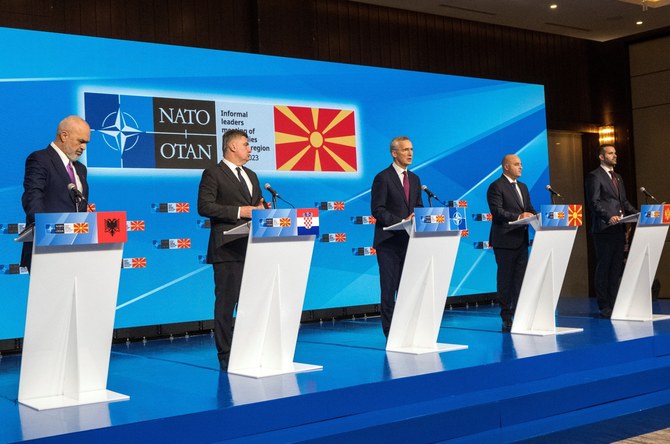Why Europe values the Balkans so highly

In another sign that Brussels is starting to give the attention that is due to the Balkans, the leaders of the region and the EU met in Montenegro last week to chart a realistic path toward eventual membership of the bloc.
This meeting followed similar gatherings in recent months held in North Macedonia and Albania. At the top of the agenda was the implementation of the so-called common growth plan established by the EU to get the region on track for membership by 2027. Between now and then, €6 billion ($6.5 billion) will be dispersed to Balkans countries to help them improve energy and transport interconnectivity and regional infrastructure.
The Balkans remains an area of unfinished business for Euro-Atlantic integration. Unsurprisingly, other than Ukraine, the region remains the biggest geopolitical challenge for Europe. Albania, Slovenia, Croatia, Montenegro and North Macedonia are already in NATO. Only Slovenia and Croatia are also in the EU. Although membership talks have begun with the other countries in the Balkans, progress toward membership has been painfully slow. For Albania, Montenegro and North Macedonia, the problem has been with the pace of the economic, governance and judicial reforms that are required to meet EU standards. Kosovo has the added problem of not all EU members recognizing its independence as a country.
Russian influence runs deep in Belgrade and, historically, Serbia has served as Moscow’s foothold in the Balkans
Luke Coffey
For Bosnia and Herzegovina and Serbia, the situation is even more complicated. In Bosnia and Herzegovina, two substate entities emerged as a result of the Dayton Accords following the civil war of the 1990s: the ethnically Bosnian and Croat Federation of Bosnia and Herzegovina and the ethnically Serb Republika Srpska. While EU membership remains popular with ethnic Bosnians and Croats, the ethnic Serbian population living in Republika Srpska are not so keen. Because there is no national consensus, there has been no meaningful progress on Bosnia’s EU (or NATO) membership aspirations.
Meanwhile, Serbian politicians pay lip service to establishing closer ties with Brussels but have made very little practical effort on this front. Russian influence runs deep in Belgrade and, historically, Serbia has served as Moscow’s foothold in the Balkans region. On the other hand, Serbia has very close economic ties to the EU. When it comes to Serbian economics, Russia takes a back seat and its economy cannot survive if cut off from the rest of Europe. What Serbia does regarding the EU also impacts neighboring Bosnia because the leaders of Republika Srpska tend to follow Belgrade’s lead on big geopolitical matters. If Belgrade decided to change track and pursue closer relations with Brussels, this would have a positive ripple effect across the region.
The Balkans region matters to Europe’s overall security and has done for decades. The Balkan Wars of 1912 and 1913 set the stage for the First World War. NATO’s first test on the battlefield after the Cold War ended was in the region. In 1995, a NATO mission was dispatched to Bosnia to stop the ethnic cleansing of Bosnian Muslims by ethnic Serbs. Another NATO operation against Serbia took place in 1999 to stop similar Serbian attacks targeting ethnic Albanians in Kosovo. Today, an EU military mission maintains the fragile peace in Bosnia and Herzegovina and NATO continues with a peacekeeping mission in Kosovo.
The fragile peace that exists in the region is under a lot of pressure. Sectarian and religious divisions are easily exploited by regional and international actors. The lackluster economic situation, exacerbated by poor governance found across the region, is another threat to stability. Secessionist rhetoric coming from the leaders of Republika Srpska threatens to undermine the territorial integrity of Bosnia and Herzegovina.
An EU military mission maintains the fragile peace in Bosnia and Herzegovina and NATO continues with a peacekeeping mission in Kosovo
Luke Coffey
Meanwhile, Kosovo and Serbia remain in a state of constant tension and crisis over the ethnic Serbian population living in the northern part of Kosovo. While major fighting has not broken out in the region in recent years, the possibility cannot be ruled out. One way to prevent this from happening is encouraging regional integration and cooperation with the ultimate goal of EU and NATO membership for all in the Balkans.
In addition to EU influence in the region, other outside actors have been active. Due to the role that NATO played in the 1990s, Americans naturally take an interest in the Balkans. However, in recent years, Washington’s interest has waned. Meanwhile, the Russians, through Serbia, view the Balkans as a region where it can easily cause problems for the West. It is no coincidence that the leader of Republika Srpska is close to the Kremlin.
China has been making significant infrastructure investments in the region to gain influence. During President Xi Jinping’s recent visit to Europe, Serbia was one of only three places that he visited. Turkiye has also been active in the region, mainly through its economic and cultural soft power in the regions of the Balkans that were once under Ottoman rule.
Europeans will go to the polls next month for European Parliament elections. Afterward, a new European Commission will be formed. At the top of the agenda will be the war in Ukraine and much-needed economic growth across the continent. But the new European Parliament and commission should not ignore the Balkans. The common growth plans are a great step toward getting the Balkan countries into the EU in 2027, but more is needed. It will take political will and leadership in Brussels to finish the unfinished business of Euro-Atlantic integration in the Balkans.






